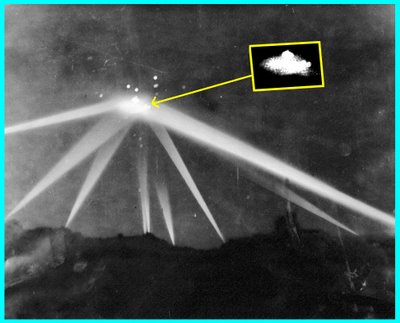
click on any image to enlarge
By C. Scott Littleton
Professor of Anthropology, Emeritus
Occidental College
Los Angeles, CA
© 2006-2009
- Part I -
An Eyewitness Account of the Mysterious Object that “Attacked” the Los Angeles Basin in the Wee Hours of February 25, 1942, plus a Ufological Assessment, Sixty-Four Years after the Fact
By C. Scott Littleton
Professor of Anthropology, Emeritus
Occidental College
Los Angeles, CA
© 2006-2009
- Part I -
An Eyewitness Account of the Mysterious Object that “Attacked” the Los Angeles Basin in the Wee Hours of February 25, 1942, plus a Ufological Assessment, Sixty-Four Years after the Fact
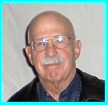 Let me begin by stating unequivocally that I don’t by any means consider myself to be a full-fledged Ufologist. Until very recently, I’ve never systematically investigated a contemporary UFO sighting or debriefed an abductee. Much of my concern with the UFO phenomenon has come from a lifetime of studying world mythology and folklore, and the extent to which it appears to have been strongly colored, if not actually engendered, by the perception of and/or interaction with alien beings, from New Guinea to ancient Mesoamerica and Mesopotamia
Let me begin by stating unequivocally that I don’t by any means consider myself to be a full-fledged Ufologist. Until very recently, I’ve never systematically investigated a contemporary UFO sighting or debriefed an abductee. Much of my concern with the UFO phenomenon has come from a lifetime of studying world mythology and folklore, and the extent to which it appears to have been strongly colored, if not actually engendered, by the perception of and/or interaction with alien beings, from New Guinea to ancient Mesoamerica and MesopotamiaI’m also very much interested in the extent to which what I call the “war of the gods” theme, which is well nigh universal, may reflect the “collateral damage” caused by a devastating colonial war between two high-tech alien civilizations for hegemony over this planet some 8,000 or 9,000 years ago
But the forgoing might be the subject of a subsequent presentation. To introduce the subject at hand, I should tell you that I’ve had three personal experiences that appear to have involved UFOs, in addition to the one that’s the focus of this talk. In 1937, four years before my family moved to Hermosa Beach, when we lived in the Highland Park district of Los Angeles, I saw what I later came to think of as a “flying French horn.”
Although I was supposed to be taking an afternoon nap, it was a bright day, the curtains of my nursery window were open, and I was definitely wide awake during the thirty seconds or so it took the strange craft to pass slowly—and soundlessly—across my field of vision. I never mentioned what I’d seen to my parents, and it apparently didn’t cause any stir in the neighborhood. (And, no, I don’t think I was abducted, but who knows for sure? Maybe someday I’ll be brave enough to undergo hypno-regression. . . .) Of course, this event occurred a decade before the expressions “UFO” and “Flying Saucer” came into existence, so I had no frame of reference.
More recently, in May of 1990, off the southern tip of Baja California, I watched a bright point of light perform exotic, right-angle maneuvers over the ocean at approximately 3:00 a.m. It was clearly not a plane or a helicopter.
And in 2003, while driving north on the I15 north of Lake Ellsinore in Southern California on a bright summer afternoon I watched a curious, doughnut shaped object emerge from behind a hill, move west across the highway at a slow speed, and then simply vanish. It was only evident for about ten seconds. My wife also glimpsed it fleetingly after I called her attention to it. I should add that few other motorists appeared to notice the peculiar object, although a couple of cars did slow down appreciably shortly after it disappeared.
But the sighting I’m concerned with here, what has come be known as the “Battle of Los Angeles,” was witnessed by over a million other people in Southern California in the wee hours of February 25, 1942, less than three months after Pearl Harbor.
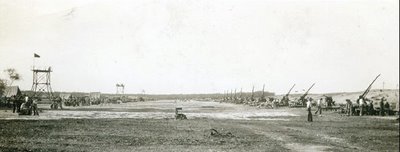
At that time, especially in communities like Hermosa Beach, California, where we’d moved in the spring of 1941 to a house that directly faced the beach, the threat of invasion was still palpable, and a great many folks—including the military—still expected us to be bombed in the near future. For that reason, the whole of Santa Monica Bay from Malibu to Palos Verdes was soon ringed with anti-aircraft batteries and searchlight brigades. The guns banged away almost every night, shooting at targets that were towed across the sky over the ocean by specially designed planes. The targets would be pinpointed by the searchlight beams, which also illuminated the exploding shells. It was a grand show that usually lasted about half an hour and rarely if ever continued much after 10:00 p.m.
At first, we kids would watch the action with great fascination, but after a few nights in early January the noise of the guns and the exploding shells soon became routine, as predictable as the sound of the waves in the winter. Most people learned to sleep through the cacophony with few problems. Indeed, it gave us a sense of security; our brave anti-aircraft gunners would quickly save us from any attempts by the nasty Japanese to penetrate our airspace.
In any case, the early evening of February 24 was unremarkable. The guns fired a few practice rounds and then fell silent well before 10:00 p.m. I remember going to bed shortly thereafter, reading for a few minutes by the light of a small flashlight I kept hidden under my pillow, and then falling asleep.
Around 3:15 a.m., I awoke to the sound of what I initially assumed was distant thunder. But as I came fully awake, I realized that the guns were firing again. At first, I thought they were simply doing another drill, though it seemed awfully late. Moreover, there was something about the rate and intensity of the bombardment that just didn’t seem right, especially after I glanced at my clock.
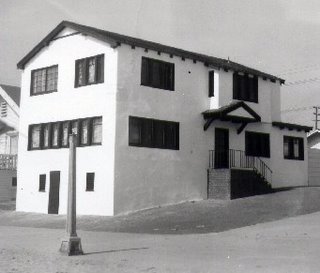 My small bedroom, which was directly over our front door, faced south, and thus my view of the ocean was oblique. However, the sky, or what I could see of, it was filled with blinding searchlights and the bright flashes of exploding rounds. I was, of course, thoroughly familiar with both, thanks to all the target practice I’d witnessed. But heretofore, the searchlights and the explosions had always been well out over the ocean and for the most part invisible from my bedroom windows, at least when I was in bed. This time everything seemed much closer.
My small bedroom, which was directly over our front door, faced south, and thus my view of the ocean was oblique. However, the sky, or what I could see of, it was filled with blinding searchlights and the bright flashes of exploding rounds. I was, of course, thoroughly familiar with both, thanks to all the target practice I’d witnessed. But heretofore, the searchlights and the explosions had always been well out over the ocean and for the most part invisible from my bedroom windows, at least when I was in bed. This time everything seemed much closer.I soon heard my parents talking in the hall, and poked my head out. My father, who was an air raid warden, looked worried and said it didn’t make any sense. He tried to get through by phone to Civil Defense headquarters, but there was no answer (we later learned that the alert had been called at 2:25 a.m., although nobody had bothered to get the word out to local air raid wardens). So, he put on his gear, and went outside to see what was happening.
He soon returned, looking even more worried, and told my mother to get me, my paternal grandparents, who lived with us at the time, and my recently widowed maternal grandfather, who’d been staying with us for a couple of weeks, down to the basement bomb shelter my father had begun building in the afternoon of December 7, ASAP.
Normally, my maternal grandfather was slower than the Second Coming of Christ in his personal habits, that is, in dressing, shaving, etc. But when my father said, “Mr. Hotchkiss, I think this may be the real thing,” he was down in the basement in thirty seconds flat!
As you can imagine, I was equal parts scared and excited and desperately wanted to know what was going on. By this time, my father was back on the street and, belatedly, over the continuing gunfire, we heard the air raid siren finally begin to wail. My mother escorted her in-laws and father down to shelter, which consisted of two small dressing rooms protected by cartons of beach sand stacked in the open basement on either side, and I followed along, despite the fact that I was eager to poke my head outside and watch “the real thing.”
My mother felt the same way. As she said later, after about ten minutes in such cramped quarters—the benches upon which we sat also contained survival items such as a first-aid kit, water bottles, and some canned food—and surrounded by the halitosis exuded by the older generation, she was ready to brave a Jap bomb or two. Indeed, our first thought was that an enemy squadron was overhead, as we began to hear the roar of aircraft engines over the din of the barrage. But they later turned out to our own pursuit planes.
When she exited the basement through the door that led to the beach, I followed close behind her. Although my mother was, of course, apprehensive about my safety, at the same time she understood why I was dying to see what was going on and let me stay.
The two of us stood side by side in front of the house, huddling together in the chill night air and staring up into the sky. The planes we’d heard were not in sight, but what captured our rapt attention was a silvery, lozenge-shaped “bug,” as my mother later described it, that was clearly visible in the searchlight beams that pinpointed it. Although it was a clear, moonlit night, no other details could be discerned, despite the fact that, when we first saw it, the object was hanging motionless almost directly overhead. Its altitude is hard to estimate, especially after all these years, but I’d guess that it was somewhere between 4,000 and 8,000 feet. This may explain why we didn’t see the orange glow reported by several eyewitnesses in Santa Monica and Culver City, where the object was apparently much lower. (One witness suggests that this glow may simply have been the reflection of shell bursts against the object’s “silvery” body.)
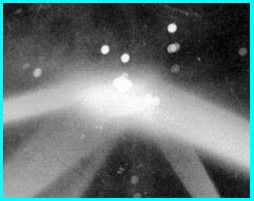 In any case, anti-aircraft shells were bursting all around the mysterious craft. The noise was almost deafening. And each time a bright red flash occurred, the acrid odor of cordite became more pronounced. Shrapnel was also falling on the beach, and my mother and I backed up against the house to avoid being struck. (The next day we kids salvaged boxes of the stuff off the sand and turned them in for scrap.)
In any case, anti-aircraft shells were bursting all around the mysterious craft. The noise was almost deafening. And each time a bright red flash occurred, the acrid odor of cordite became more pronounced. Shrapnel was also falling on the beach, and my mother and I backed up against the house to avoid being struck. (The next day we kids salvaged boxes of the stuff off the sand and turned them in for scrap.)However, between shell bursts, the craft emitted no sound whatsoever. Nor was it acting aggressively.
As we watched, open mouthed, the object, apparently none the worse for the plethora of rounds directed at it, began to move slowly to the southeast, descending over Redondo Beach, where we lost sight of it. Indeed, either our gunners were absurdly inept, despite all the practice they’d had in recent weeks, or it was invulnerable to attack. Years later I read that over 1,400 rounds were fired at the object that evening. The official tally, from the Army’s after-action report, is 1430 rounds, but this figure is probably way too low. Could the Japs have come up with some secret weapon that deflected flack? The thought was scary to the max!
The object later appeared over San Pedro and Long Beach before finally disappearing over the ocean somewhere off southern Orange County or northern San Diego County.
Shortly after my mother and I lost sight of it we once again heard the unmistakable sound of aircraft engines. By then the bombardment had almost petered out, and several Army Air Corps interceptors, P-38s that were probably based at Mines field (today the site of Los Angeles International Airport), approached from the northeast and buzzed off to the southeast, apparently chasing the object.
At that point, it was almost 4:00 a.m. Precisely how long we’d stood there is anybody’s guess, though I suspect that the whole episode, that is, from our leaving the shelter to meeting my father as he returned to house after both the object and the chase planes had disappeared, lasted about twenty-five minutes.
As I recall, the firing ceased shortly thereafter (the “all clear” didn’t actually sound until 7:30 a.m.), but nobody went to bed that night. The next morning’s edition of the Los Angeles Examiner, the local Hearst newspaper, which I still have tucked away safely, came out with a screaming, banner headline: “Air Battle Rages over Los Angeles,” followed by “One Plane Reported Downed on Vermont Avenue by Gunfire” in smaller type. This, of course, seemed at the time to be pure fantasy, typical Hearst yellow journalism, as no bombs fell, nor, apparently, was any plane, Japanese or otherwise, shot down anywhere in Southern California that night. However, in retrospect, the Examiner seems to have been right about one thing. As we’ll shortly see, there’s compelling evidence to support the contention that at least one of our planes did in fact crash (or crash-land) on South Vermont Avenue that morning
But what precisely had we witnessed?
No comments :
Post a Comment
Dear Reader/Contributor,
Your input is greatly appreciated, and coveted; however, blatant mis-use of this site's bandwidth will not be tolerated (e.g., SPAM, non-related links, etc).
Additionally, healthy debate is invited; however, ad hominem and or vitriolic attacks will not be published, nor will "anonymous" criticisms. Please keep your arguments/comments to the issues and subject matter of this article and present them with civility and proper decorum. -FW